Ad astra, via Milano: Eurisy at the 75th International Astronautical Congress
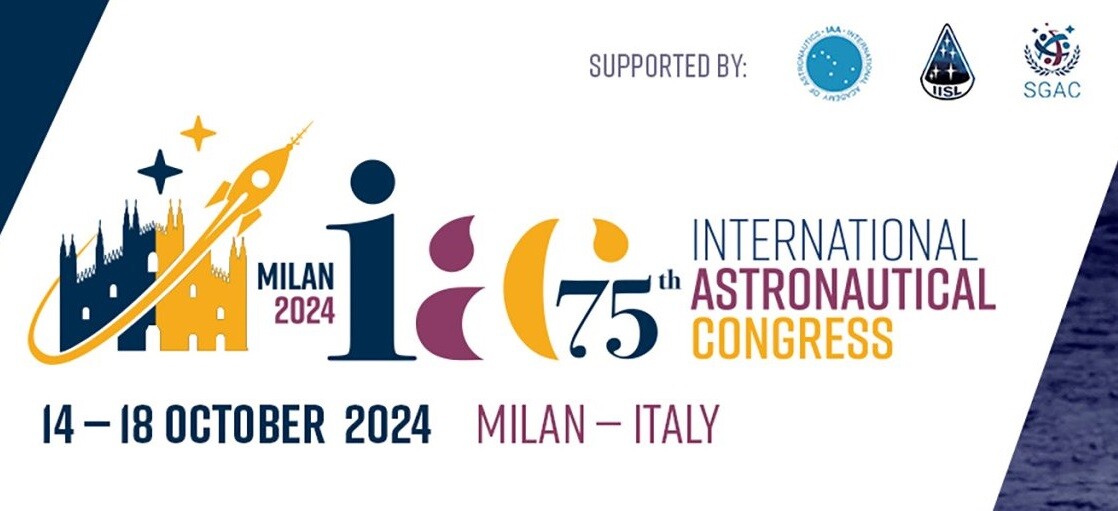
Milan was abuzz with energy as the diverse and enthusiastic international space community gathered in the city for the largest space event of the year: The 75th International Astronautical Congress (IAC). Over 8,000 participants from throughout space sector and all across the globe, from agencies to industry, research to innovation, exploration to applications, gathered for one week of discussions, dialogue, panels and presentations, forming a hub for creativity and collaboration featuring a variety of voices charting the future of the space sector.
There could hardly be a more appropriate city to host such an event, where human creativity and scientific innovations have rich historic roots, as recalled during the opening ceremony, paying homage to Leonardo da Vinci both as a scientist and artist who lived and worked in Milan. The importance of the space sector across all of society could be seen in the front row alone, where alongside astronauts, space agency heads and prominent figures of the space industry were President of the Italian Republic, Sergio Mattarella, and the Italian Minister of Economic Development Adolfo Urso.
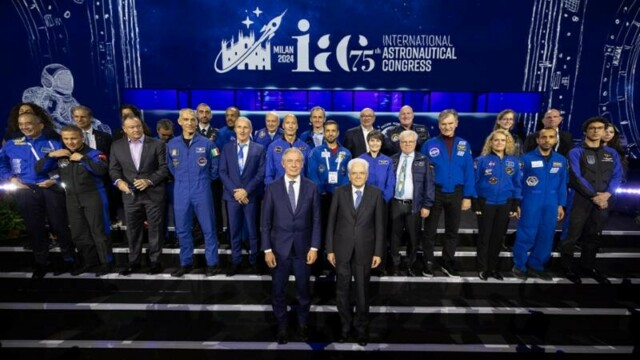
President of the Italian Republic, Sergio Mattarella, and the Italian Minister of Economic Development Adolfo Urso accompanied by a distinguished group of astronauts.
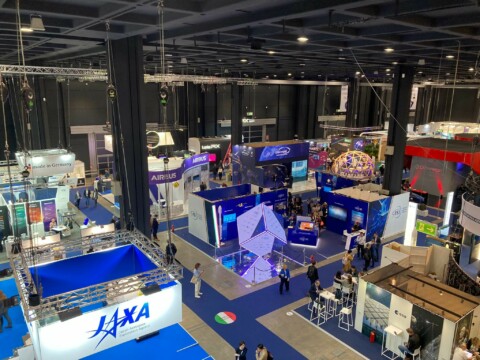
The exhibition area.
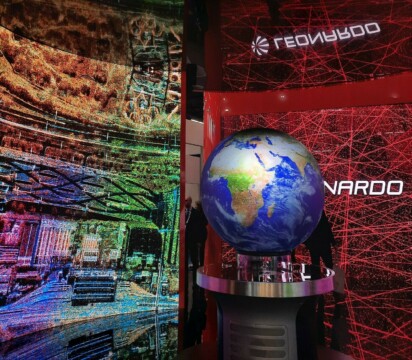 The overarching theme of IAC 2024 was “Responsible Space for Sustainability” underscoring the importance of using space technology and exploration to address global challenges, from climate change, resource management, to sustainable development. Throughout the conference it was recognised that space must do more to reach out to non-space sectors to tackle shared societal challenges. Doing so will require not only new technologies, but also innovative ways of working collaboratively across society to highlight the role space can play and to connect capabilities with those who could need them the most.
The overarching theme of IAC 2024 was “Responsible Space for Sustainability” underscoring the importance of using space technology and exploration to address global challenges, from climate change, resource management, to sustainable development. Throughout the conference it was recognised that space must do more to reach out to non-space sectors to tackle shared societal challenges. Doing so will require not only new technologies, but also innovative ways of working collaboratively across society to highlight the role space can play and to connect capabilities with those who could need them the most.
Eurisy was present throughout programme, from the bi-annual Hubert Curien Award Ceremony, interactive presentations, paper sessions and panels, to meeting with partners, old and new, and continuing to represent our members on our shared mission to bridge space and society. Eurisy also continued our longstanding partnership with the IAF, participating in committee meetings and the IAF General Assembly.
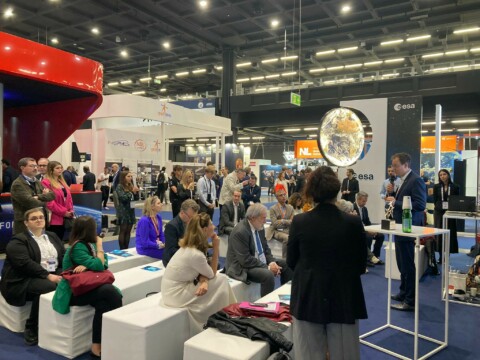
The major highlight of the week was the announcement of the 2024 Hubert Curien Award Laureate, recognising the “outstanding efforts to help society benefit from space”. Three were this year’s official nominees: Space for Climate Observatory, Cosmos for Humanity and Spacebuzz.
Despite a final selection of nominees all having achieved extraordinary results in their field, our panel of high-level experts could choose only one, and ultimately it was the Space for Climate Observatory, based in Paris, that was victorious.
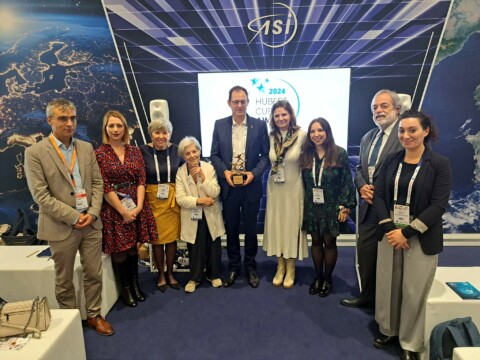
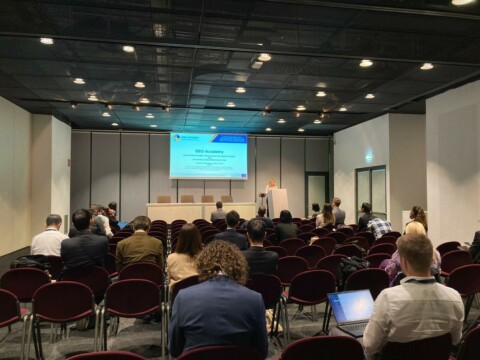
Eurisy’s activities across our thematic areas were on show throughout sessions, including presentations by Žaklin Butinar on Eurisy’s skills initiatives in the GEO-Academy and SpaceSUITE project, the former supporting primary and secondary school teachers develop their space and digital competencies to teach about climate change and sustainable development. Read here the full research.
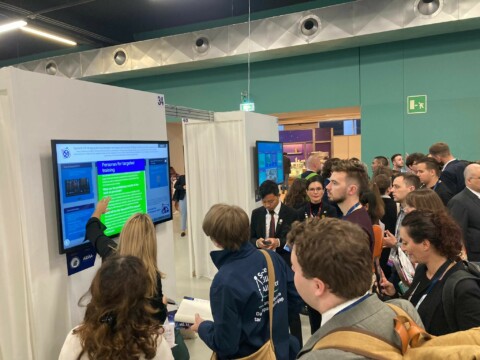
The interactive presentation on SpaceSUITE meanwhile, explored with participants how the project brings together both the space sector and HE and VE education establishments to ensure Europe has a downstream space sector workforce ready for the future from the moment student’s graduate. Read here the full research.
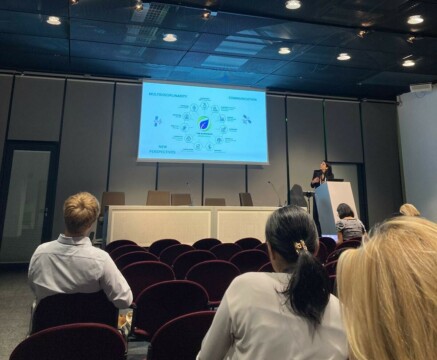
Gabriella Quattropanetti presented her research on satellite applications supporting the EU Green Deal. The study delved into the links between space solutions and EGD targets, highlighting how these applications can help achieve the goals. A special section on success stories was included to illustrate real-life examples and raise awareness about the benefits of space solutions for communities outside the space sector. Read here the full research.
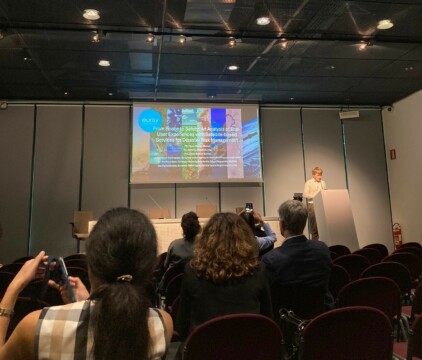
Henry Boeree discussed the results so far from Eurisy and EUSPA ongoing collaboration on Disaster Risk Management throughout Europe. Focusing on end-users experience integrating satellite-technologies in disaster risk management, it was highlighted that users need different capabilities during different stages of the disaster risk management cycle, with EO most prominent during the Mitigation and Preparedness phase, but satellite communications increasingly perceived as necessary during acute crisis response. An upcoming interactive dashboard on disaster risk management was also teased to attendees. Read here the full research.
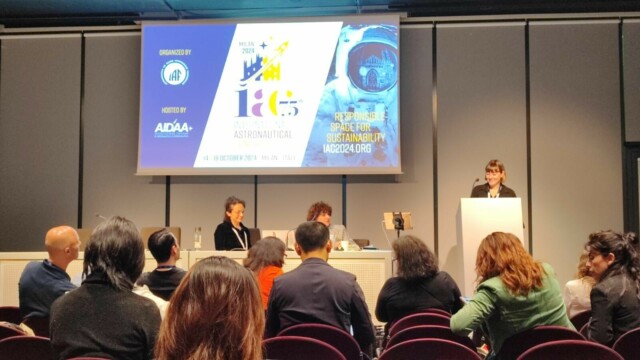 Last but not least, Anaïs Guy showcased the THETIDA project on underwater cultural heritage during a truly eclectic panel on the importance of space and culture. Alongside a demonstration of THETIDA’s space-enabled mobile app providing near-real time information about underwater cultural sites, which has been co-developed with local communities through a Living Lab methodology, were presentations on art expositions on art and space in indigenous cultures, discussions on science fiction’s role in society, and a meditative workshop on the value of eating meteorites. The consensus reached across these perspectives is that culture is an integral part of space, and can contribute to the space sector as much as space contributes to culture. Read here the full research.
Last but not least, Anaïs Guy showcased the THETIDA project on underwater cultural heritage during a truly eclectic panel on the importance of space and culture. Alongside a demonstration of THETIDA’s space-enabled mobile app providing near-real time information about underwater cultural sites, which has been co-developed with local communities through a Living Lab methodology, were presentations on art expositions on art and space in indigenous cultures, discussions on science fiction’s role in society, and a meditative workshop on the value of eating meteorites. The consensus reached across these perspectives is that culture is an integral part of space, and can contribute to the space sector as much as space contributes to culture. Read here the full research.
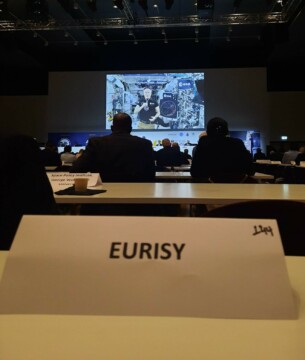 Finally, IAC 2024 was also a perfect place to reconnect with Eurisy’s members, with many present and continuing to advance their activities, developing local ecosystems and collaborating across countries and agencies. Just one example of many was Eurisy members IEEC signing the Joint Statement for a responsible space sector, committing to a responsible and sustainable use of space alongside one of this year’s nominees of the Hubert Curien Award, Cosmos for Humanity.
Finally, IAC 2024 was also a perfect place to reconnect with Eurisy’s members, with many present and continuing to advance their activities, developing local ecosystems and collaborating across countries and agencies. Just one example of many was Eurisy members IEEC signing the Joint Statement for a responsible space sector, committing to a responsible and sustainable use of space alongside one of this year’s nominees of the Hubert Curien Award, Cosmos for Humanity.
Concluding the event was the IAF General Assembly, to which Eurisy participates in as members. Among the decisions voted upon was the host city for the IAC in 2027, for which Poznan, Poland was selected.
